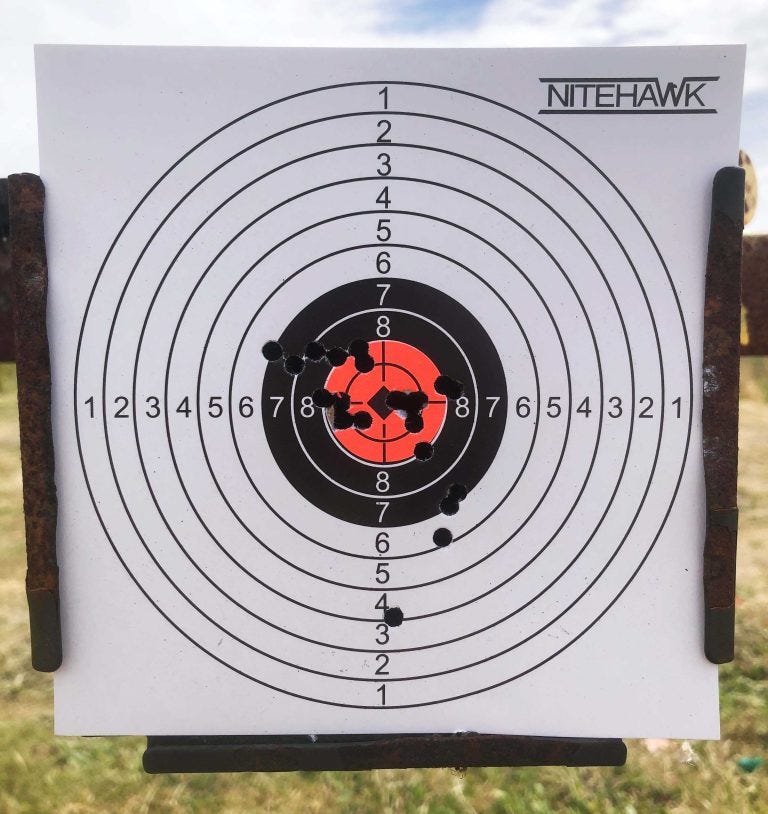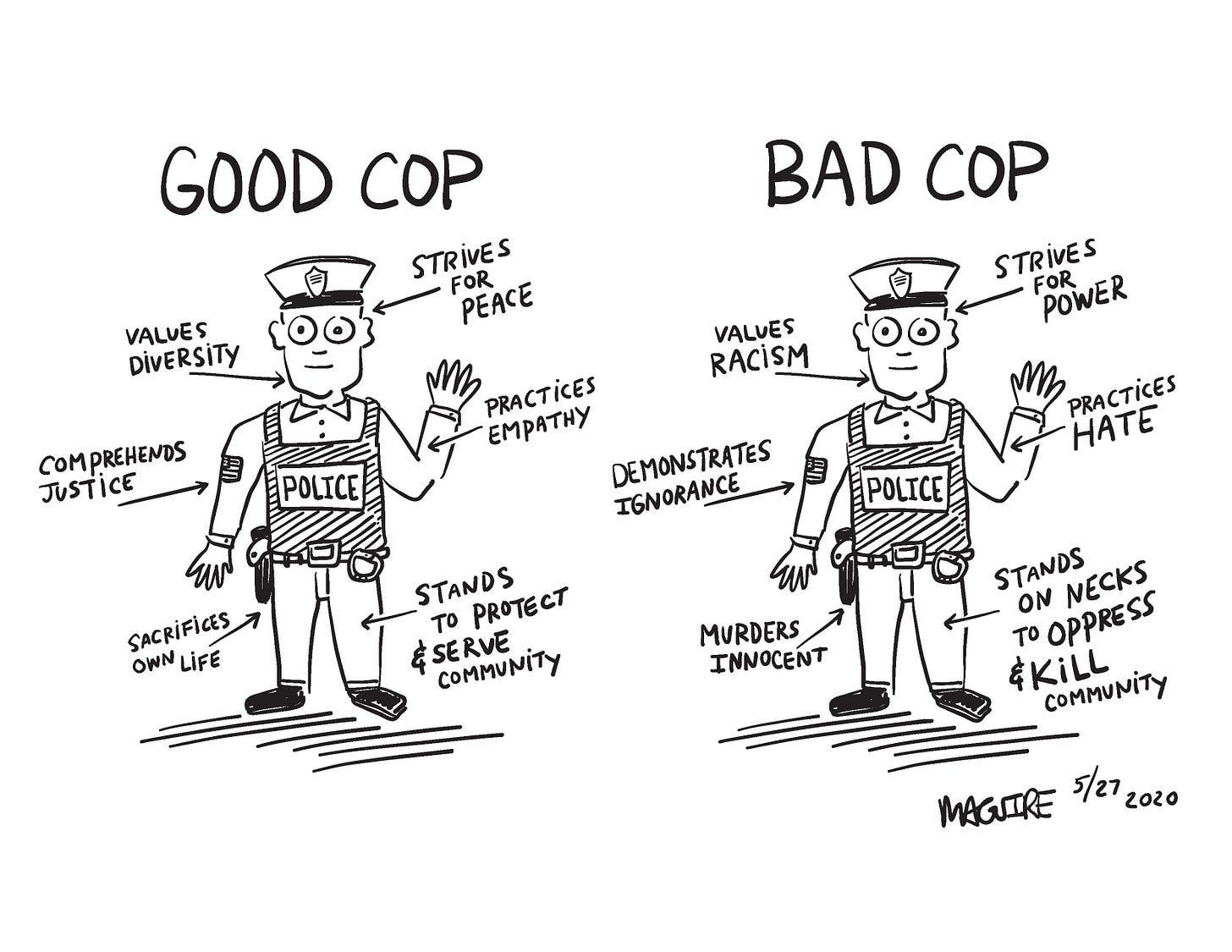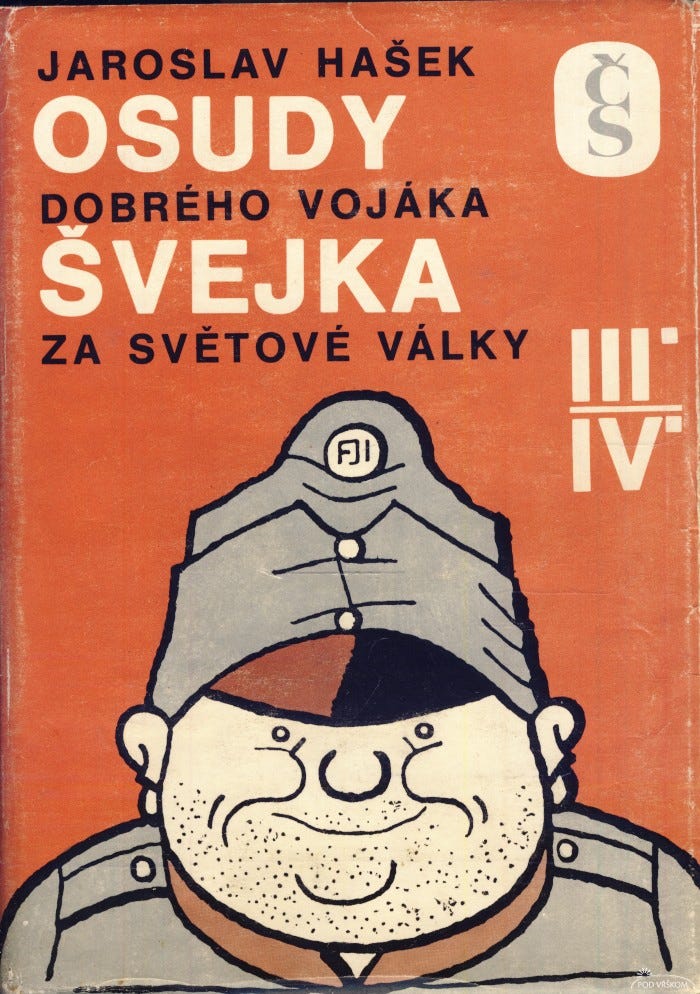The Replicant, the Mole & the Impostor, Part 30
Part 2—the conclusion—of a duology where a reality event held in a refugee camp on a Greek island unfolds in an utterly unexpected manner. There will be 50 parts. Chapter 9: April.

—Near the Playground—
Just outside the playground, the Arab man meets his acolyte who—on this occasion—is right on time, showing he didn’t forget last time’s lessons. In the background, enthusiastic cries sound as the—mostly Muslim—women are playing football on the playground’s field. The Arab man has stopped pretending to cheer them on as he just waits for his minion to turn up.
“Follow me,” the Arab man says as they make their way to a hillside field, hidden between dense bushes. The Arab man folds out a paper on which a circular target is printed and attaches it to a tree at the edge of the field. He walks back to his acolyte and takes something out of his bag.
“Here’s a gun,” he says, “and a silencer. For your true mission you won’t need the silencer, but we’re using it here to avoid drawing any undue attention.”
“I’ll show you how to aim the gun,” the Arab man says, “and hit the target.” He fires a few near soundless shots that all hit the central target. “Now you.”
The young man takes the gun, aims and misses as he’s caught by surprise by the gun’s recoil.
“It’s better to use two hands at first,” the Arab man says. “Until you get used to the kickback.”
The young man follows his instructions and some of his next shots do hit the target, albeit not quite dead center.
“That’s better,” the Arab man says. “Now you have to take into account the fact the bullet drops a bit due to gravity. So aim slightly above the target.”
The young man fires a few more shots.
“Next, find out from which way the wind blows, and take that into account as well.”
The shooting lesson continues until they run out of ammunition.
“Not bad for a beginner,” the Arab man says. “Meet me at the same place, same time, next week. Unless you have some questions?”
“Well, Master,” the young man says, trepidation in his voice, “have you heard about the ENE that the other refugees have set up?”
“That hasn’t escaped my notice,” the Arab man says. “Why?”
“Last week, they released their Citizen Test,” the young man says. “I took it.”
“What,” the Arab man says, visibly annoyed. “You tried to join that false kingdom, that heathen castle in the sky without telling me?”
“I’m sorry, I’m so sorry, Master,” the young man says under his superior’s glare. “I just thought you might want me to infiltrate them as well.”
“No need,” the Arab man says. “That particular endeavor will most certainly come to nothing. It would have been a waste of time. And didn’t they turn you down?”
“Yes, they did, Master,” the young man says. “They told me I failed at their ethical assessments.”
“Told you so,” the Arab man says, and Seneth’s extremism peaks. “They’re like scorpions, like the Serpent. They will act as if they will accept you, but when push comes to shove they will always favor their own. You never stood a chance.”
“But aren’t the ENE people from outside the western world as well?” the young man wonders.
“They’ve been infected, just as they’re trying to do with you,” the Arab man says, “and they’ve fallen for their wicked ways, while you still stand strong. They are now corrupted, while you remain clean.”
“I see,” the young man says. “Are they really both vile and forward-thinking?”
“Of course, they are very dangerous, young warrior,” the Arab man says. “That’s why they almost rule the world. That’s why we’re fighting against the odds. Yet we can win, if all of us—you included—do not stray from the right path. You with us?”
“Yes, Master,” the young man says.
“So always watch out,” the Arab man says, “as you are finally beginning to understand how devious they are.”
“I will, Master.”
“Good,” the Arab man says. “Dismissed.”
—At the Residence—
For the first time in months, the reality event candidates have a leisurely morning. Normally, all of them would have a fairly quick breakfast before going into the camp to help start up another project or assist with projects already underway. However, things are rather quiet in both the Middle Eastern and African sections of the camp of late.
While the Muslims of the Middle Eastern section have worked extraordinarily hard to get their mosque finished before Ramadan, they are now catching up on their rest in between their fasting and prayers. Most of the Africans are at work in the renovation project in Chorió, and while Omar and others have offered to help, Jean-Pierre assured them, time and again, that they have more than sufficient workers already.
“You mean well, I know,” Jean-Pierre said to Omar, “but we have more than enough people, who—to be frank—are more skilled in our—” He pointed at his AR-gear, “—new way of working than you. You’re always welcome for tea, or a nice chat, but it’s better if you let us do the work. And I’m sure you have plenty of other projects on your plate as it is.”
Most of the women in the Women & Children section are busy, as well. Not just taking care of the children, but developing AR-apps—many of them involving education for the children—keeping the place clean, and checking and maintaining the new equipment as well. They also don’t seem to be in need of anything urgently.
The only ones still busy are Dewi, Agnetha, and Rahman. Dewi with preparing both practical exercises and theoretical lessons for the refugee children, even if she’s not in the communal dining room right now. Neither is Agnetha, who can spend whole days in AR-space if necessary, while nobody knows what she’s up to in there. Rahman sits at the table, head down in some kind of paperwork—with real paper, of course—where also nobody has a clue as to what he’s really doing. The rest are either quite tired, bored, or both.
“I feel like a good police officer,” Esteban, who—atypically—is not sitting next to Katja, says. “Like I’ve been—”
“Are there good police officers?” Omar says. “If there are, they must’ve been avoiding our banlieues like the plague.”
“Maybe they’re like truffles,” Akama says. “Only in season and very well hidden.”
“So one would need pigs to find good cops?” Esteban says. “Somehow I think it doesn’t quite work that way.”
“No,” Akama says, “that’s so old-fashioned. You use dogs.”
“Ah, police dogs,” Omar says. “The ones you never see because they’re constantly looking for the good cops they’ve been told exist.”
“Come on, Omar, I’m supposed to be the snarky one,” Esteban says. “As I was saying, I feel like an ideal police officer—or an ideal social worker, or an ideal psychiatrist—whose true task is to educate or uplift people so that they won’t need them anymore. One who—utterly unexpectedly—has been so successful that he’s made himself obsolete, and is now wondering what to do with his time.”
“Even if that’s true, and I think there’s still a lot to be done,” Katja—who is at the opposite side of the room from Esteban, as if she’s deliberately avoiding him, but can’t help answering, says, “there’s a whole world that needs help out there.” Her arms make a big, circling gesture.
“I don’t deny that,” Esteban says, seemingly happy that she’s at least answering him. “But we’re stuck with this particular refugee camp for two to six more weeks.”
“You’re saying our work is done?” Kristel says.
“Well, a lot of what we set out to do is,” Esteban says. “Or at least seems to be. So maybe we need to start a new project?”
“So close to the end?” Kristel says. “Will we have the time and resources to finish it?”
“Otherwise we twiddle our thumbs,” Esteban says. “Or engage in our hobbies.”
“Such as?” Piotr—the workaholic who used to be at a loss for things to do after work—wonders.
“Beer brewing?” Esteban suggests.
“Pointless,” Akama says. “By the time you make a brew kettle and barrels, the show will be over and you’ll have to lug it back to Spain with you.”
“A winery?” Esteban suggests, knowing better.
“It takes years to set up proper grapevines,” Akama, taking the bait, says. “Forget it.”
“A whisky distillery?” Esteban is now purposefully thinking of long-term schemes.
“Whisky must have aged at least three years in barrels before you can call it whisky,” Kristel says. “And at least twelve years before it starts tasting good.”
“What would you know about that?” Esteban says.
“I’m a whisky aficionado,” Kristel says. “And women have better developed smell and taste, so we appreciate it more than men. You better stick to your beer.”
“Which I won’t be able to brew here,” Esteban says. “So do we have any other ideas of what to do?”
“Roughly speaking, most of the really urgent issues seem to have been addressed,” Olga says. “Meaning their problems are either becoming luxury problems or first world problems.”
“Is there a difference?” Esteban says.
“Maybe we—and they—have gone too far,” Olga says, ignoring Esteban’s remark. “As they’re turning this place—however horrible it was before—into their home, some might be reluctant to leave, especially if their asylum requests are turned down.”
“Which would be so unjust,” Katja says. “These people have been through so much just to get here, and then worked so hard to make their life at least bearable, they deserve to have their asylum approved.”
“On the one hand, a couple thousand refugees—especially those with skills and a great willingness to work—should be easily assimilated into the EU,” Olga says. “On the other hand, there are many, many more refugee camps out there—Turkey is supposed to house over two million refugees—so when will they become too much?”
“We’re here now,” Katja says. “So we help these people first. After this event is done, we can call on people to improve the other camps in Greece as well.”
“Which we have,” Olga says. “So maybe we should turn our focus elsewhere? For example, to the authorities who handle the asylum requests?”
“Fight the bureaucracy?” Piotr says. “Maybe you should read Franz Kafka first.”
“You read him?” Olga says. “Wonders never cease.”
“I’ve become a fan of Czech playwrights and writers ever since The Good Soldier Švejk,” Piotr says, “when the 70s TV series had a rerun in Poland.”
“Maybe,” Rahman says, “we should have a little break, catch our breath. Take it easy for a day. I say we deserve it.”
“Who appointed you the voice of reason, Rahman?” Olga says. “Again, wonders never cease.”
And just like that, they decide to take the morning off, and stay in the residence for a change. They make coffee and tea, goof off a bit, hang and chill out. After all these months, the lull in activity feels very, very weird. Although the candidates try really hard to relax—and if you have to work for it, it’s not really relaxing—after a while, something has to give.
“Let’s have lunch in the village?” Kristel says, semi-innocently as she gets bored from being bored.
“Great idea,” Omar says, who’s about to explode from pent-up energy.
“All ten of us,” Piotr says. “How long since that last happened?”
“Yeah,” Kristel says. “Let’s get Dewi and Agnetha.”
Olga—Dewi’s roommate—checks their room. “She’s not here,” Olga says.
Piotr—Agnetha’s roommate—knocks on the door of their shared bedroom, then goes in.
“Holy shit,” he says. “I guess I know where both of them are.”
“It’s alright,” Agnetha shouts through the closed door. “Just give us some time to get dressed.”
A few minutes later, Dewi leaves Agnetha and Piotr’s bedroom, her cheeks burning red.
“You and Agnetha?” Olga says. “Wonders never cease.”
“Not only that,” Piotr says, “but aren’t you married?”
“I am,” Dewi says, “and if you don’t mind, I’m going to give a quick call to my husband.” Dewi quickly disappears into her and Olga’s bedroom. Two minutes later, she’s back.
“He’s not at home,” she says. “I left a message. I’ll try again tonight.”
“You wanna be alone?” Katja says. “We can have lunch without you.”
“Without me,” Dewi says. “I’m not here anyway.” Her eyes roll all the way up and disappear behind her eyelids.
“Don’t faint,” Katja says. “Stay awake.”
“No, I’ll come along,” Dewi says as her eyes return to normal. “It was bound to come out, anyway. Might as well deal with it right now.”
“Well, we’re not insulted in any way,” Akama says, “merely surprised. You and Agnetha?”
“We worked together a lot in the residence while all of you were out in the camp,” Dewi says.
“But wasn’t Rahman here, as well?” Piotr says. “Most of the time?”
“Well, once Rahman focuses on his paperwork, he completely forgets about the world around him,” Dewi says. “No offence, Rahman, but your concentration is really deep.”
“No problem, Dewi,” Rahman says. “I take that as a compliment. If I apply myself, I don’t take half-measures.”
“Indeed,” Dewi says. “So there was quite a bit of flirting going on, in plain sight, even.”
“Where there’s a will, there will be a way,” Esteban says. “But why?”
“I do miss my husband, very much,” Dewi says. “Ten months is a very long time to be separated.”
“But, Agnetha?” Omar says. “Not a fine, male specimen like Akama, Piotr, or—well—me?” He quickly turns to Rahman. “You’re also a fine male specimen, Rahman, but of the married kind.”
Rahman just laughs. “I pity the woman crazy enough to marry you.”
“If she’s really the one,” Omar says, “she’ll make me behave. Anyway, Dewi hasn’t answered my question.”
“I suppose I must be a little bit bisexual,” Dewi says. “Which I didn’t quite realize before.”
“A little bit?” Agnetha says. “You make most dykes pale in comparison.”
“I might have become a bit enthusiastic during the experimentation,” Dewi says, blushing again. “If I explore something new, I try to be thorough.”
“No comment,” Agnetha says. “And I knew you’d be going back to your husband.”
“Well, I have to apologize and explain it to him first,” Dewi says. “Wish me luck.”
“Best of luck, baby,” Agnetha says. “And he better forgive you, the lucky bastard. You’re one of a kind.”
“So you’re not angry if we, well, end the affair?” Dewi says, her voice a mix of hope and fear.
“Of course not, I knew it wouldn’t last,” Agnetha says. “But it’s been a hell of a ride.”
“It’s been quite, ehrm, interesting,” Dewi says.
“That’s the greatest compliment you can get from a teacher,” Esteban says. “I’d take it.”
The rest of the group—Agnetha including—just applaud.
“Oh, well,” Dewi says, who’s now blushed more in one morning than in the preceding eight-and-a-half months. “Let’s get lunch, shall we?”
🌚🌞🌝
Support this writer:
Like this post!
Re-stack it using the ♻️ button below!
Share this post on Substack and other social media sites:
Join my mailing list:
Author’s note: three per week, three per week, three per week. Everything I say three times is true…;-). We’ll get here before the end of the year. Many thanks for reading and enjoy!








